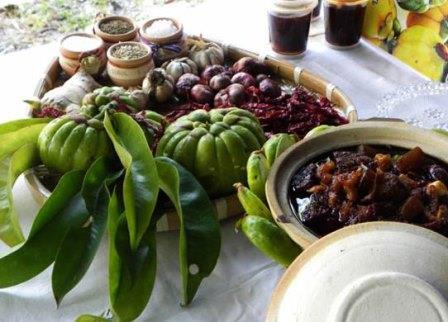Why biodiversity matters for food and nutrition security

M. Ann Tutwiler's latest blog is on the role that agricultural biodiversity can play in reducing malnutrition. Ann is taking part in an expert panel today at the 6th International Forum on Food and Nutrition being held in Milan.
Today I am participating in an expert panel at the 6th International Forum on Food and Nutrition, where I will highlight the role that agricultural biodiversity can play in reducing malnutrition.
The 2014 Global Nutrition Report tells us that people in almost every country – rich and poor – are affected by some form of malnutrition. When we think of malnourishment, we often think of those with not enough to eat, but it is not that simple. 2 billion people are missing the vital minerals and vitamins they need in their diets. While the main cause of hunger is poverty, an important underlying cause of obesity and micronutrient deficiencies is poor diet.
We are seeing enormous changes in diets throughout the world through urbanization and the homogenization of diets. One of the most dramatic effects of these changes is the shrinking of diversity within our global food system. Many nutritious species, including wild foods and indigenous fruits and vegetables have fallen off food menus and agricultural research agendas.
Until recently the focus of most nutrition work has been to fortify foods with single nutrients, or to focus on reducing one element of people’s diets – e.g. low fat, low sugar, low salt. I believe that this is a very medical approach to nutrition. At Bioversity International, we focus on whole of diet which is an approach that will serve people throughout their lives.
We work with farmers and rural communities, looking beyond single nutrients and individual foods to identify combinations of locally-accessible foods to meet nutrient needs throughout the year, that are also culturally acceptable, affordable, sustainable and safe.
As part of a global initiative* led by four countries – Brazil, Sri Lanka, Kenya and Turkey – Bioversity International is working to mainstream biodiversity into policies and programmes that improve nutrition and well-being. For example, in Brazil, the government’s Food Acquisition Program is providing local, diverse and nutritious foods for public initiatives such as school meals, while at the same time, supporting family farms.
I am very encouraged to see that as the evidence linking agricultural biodiversity to enhance food and nutrition security grows, newcomers are arriving at the table not just to find out more, but also how to get involved and help drive change. We are seeing this at international fora, such as the recent Twelfth Meeting of the Conference of the Parties to the Convention on Biological Diversity Convention on Biological Diversity (CBD COP12) and the International Conference on Nutrition (ICN2). Nutrition is getting a higher profile within the CGIAR system – one of its four major strategic level outcomes is now ‘improved nutrition and health’.
We are also seeing change through the actions of consumers and producers. International agreements such as the Milan Protocol address the sustainability of food chains and include food companies, who are committing to sustainably source materials for their production. Consumers are increasingly insisting on knowing more and more about the food they eat and where it comes from. At Bioversity International, we believe that consumers drive the sustainable production of diverse, nutritious foods which means that creating markets for diverse foods is essential if farmers are to plant and earn income from them.
This progress is encouraging and is bringing global attention to the important role agricultural biodiversity has to play in preventing malnutrition, reducing poverty and improving our environment. But this is just a subset of the larger malnutrition challenge. I will leave you with this thought –out of the 169 proposed Sustainable Development Goals, only one currently mentions nutrition.
M. Ann Tutwiler
Email: [email protected]
*The GEF 'Mainstreaming biodiversity for nutrition and health' initiative is led by Brazil, Kenya, Sri Lanka and Turkey and coordinated by Bioversity International, with implementation support from the United Nations Environment Programme (UNEP) and the Food and Agriculture Organization of the United Nations (FAO) and additional support from the CGIAR Research Program on Agriculture for Nutrition and Health.
